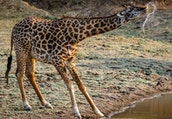- 1. Africa Elephant Species: There are two recognized species of African elephants: the African bush elephant (Loxodonta africana) and the African forest elephant (Loxodonta cyclotis). They are distinct in terms of their physical characteristics and habitat preferences.
- 2. Africa Elephant Size: African elephants are the largest land mammals, with males reaching an average height of 10 to 13 feet (3 to 4 meters) at the shoulder and weighing between 4,000 to 7,000 kilograms (8,800 to 15,400 pounds). Females are slightly smaller, but still impressive in size.
- 3. Africa Elephant Habitat: Habitat: African elephants are found across various habitats in sub-Saharan Africa, including savannas, grasslands, forests, and marshes. The African bush elephant is more commonly found in open habitats, while the African forest elephant is adapted to dense rainforests.
- 4. Africa Elephant Trunk and Tusks: African elephants are known for their distinctive trunk, which is a fusion of their upper lip and nose. The trunk is a versatile tool used for various tasks, such as feeding, drinking, communication, and manipulation of objects. Both male and female African elephants have tusks, which are elongated incisor teeth. Tusks are primarily used for defense, digging, and as display during social interactions.
- 5. Africa Elephant Behavior and Social Structure Behavior and Social Structure: African elephants are highly social animals that live in complex family groups called herds. These herds are usually led by a matriarch, an older and experienced female. They communicate using a variety of vocalizations, body postures, and infrasound, which is sound below the range of human hearing.
- 6. Africa Elephant Diet African elephants are herbivores, primarily feeding on a variety of vegetation, including grasses, leaves, bark, fruits, and roots. They have a high daily intake of food and water to sustain their large size.
- 7. Africa Elephant Conservation Status TAfrican elephants are classified as vulnerable by the International Union for Conservation of Nature (IUCN). They face numerous threats, including habitat loss, poaching for ivory, and human-elephant conflicts. Conservation efforts and protected areas aim to safeguard their populations and habitats.
Africa Elephant:
The African elephant is one of the most iconic and majestic animals found on the African continent. African elephants are not only charismatic animals but also play a crucial role in their ecosystems as ecosystem engineers and seed dispersers. They are a symbol of Africa's wildlife heritage and are a popular attraction for wildlife enthusiasts and tourists seeking to witness their beauty and observe their behavior in their natural habitats.
Africa Safari Tour Book online The cheetah safari
Here is some information about African elephants:








 |
|  |
|  |
|  |
| 